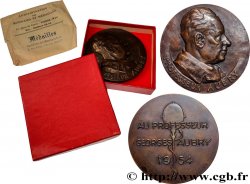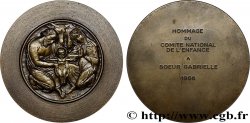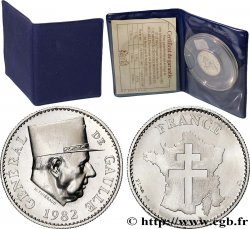fme_1001410 - VIERTE FRANZOSISCHE REPUBLIK Médaille, Cinquantenaire du condomnium Franco-Britannique
Nicht verfügbar.
Artikel auf unserem Online-Shop verkauft (2025)
Preis : 180.00 €
Artikel auf unserem Online-Shop verkauft (2025)
Preis : 180.00 €
Type : Médaille, Cinquantenaire du condomnium Franco-Britannique
Datum: 1956
Name der Münzstätte / Stadt : Nouvelles-Hébrides
Metall : Bronze
Durchmesser : 67,5 mm
Stempelstellung : 12 h.
Graveur GUIRAUD Georges (1901-1989)
Gewicht : 153,47 g.
Rand lisse + corne BRONZE
Punze : corne BRONZE
Kommentare zum Erhaltungszustand:
Patine hétérogène avec des taches noires d’oxydation et quelques concrétions. Petite usure sur certains reliefs. Présence de quelques fines rayures au revers
N° im Nachschlagewerk :
Vorderseite
Titulatur der Vorderseite QUEIROZ / 1606 - BOUGAINVILLE / 1768 - COOK / 1774.
Beschreibung Vorderseite Entourant un “totem” sculpté par les autochtones de ces îles de l’océan Pacifique, les noms du Portugais Queiroz qui y aborda le premier en 1606, du français Bougainville qui redécouvrit l’archipel en 1768 et du britannique Cook qui y aborda en 1774. Signé : GEORGES GUIRAUD (ancre).
Rückseite
Titulatur der Rückseite CONDOMINIUM FRANCO-BRITANNIQUE DES NOUVELLES HEBRIDES // ILES BANKS / 168°E / ESPIRITU / SANTO / AURORE / AOBA / PENTENCOTE / MALLICOLO / AMBRYN / EPI / MAI / VATE / 18°S ERROMANGO // J. BOISROND.
Beschreibung Rückseite Carte géographique, sur fond de bord de mer avec palmier, présentant les îles composant l’archipel. A l’arrière plan, un navire entre dans une rade bordée de végétation tropicale.
Kommentare
Médaille décernée à J. Boisrond.
Le condominium des Nouvelles-Hébrides, en anglais New Hebrides Condominium, était une colonie franco-britannique érigée dans l'archipel des Nouvelles-Hébrides, sur le territoire de l'actuel Vanuatu, du 2 décembre 1907 à son indépendance le 30 juillet 1980. C'est l'un des deux condominiums coloniaux du XXe siècle avec le Soudan anglo-égyptien et le « dernier exemple du régime condominial s'appliquant à un territoire et à une population d'importance notable ».
Régime original dû à l'impossibilité pour l'un et l'autre des deux pays d'abandonner l'archipel, il a la particularité de voir s'exercer trois souverainetés : celles propres des deux États envers leurs nationaux et leurs sociétés, celle du condominium pour les indigènes, les relations entre les différentes nationalités, l'administration et les services condominiaux. Il a pris fin avec l'indépendance des Nouvelles-Hébrides en 1980 après deux ans de transition. L'État nouvellement créé prit alors le nom de Vanuatu..
Medal awarded to J. Boisrond. The New Hebrides Condominium was a Franco-British colony established in the New Hebrides archipelago, in the territory of present-day Vanuatu, from December 2, 1907 until its independence on July 30, 1980. It is one of the two colonial condominiums of the 20th century, along with Anglo-Egyptian Sudan, and the \\\"last example of the condominium regime applying to a territory and a population of notable importance.\\\" An original regime due to the impossibility for either country to abandon the archipelago, it has the particularity of seeing three sovereignties exercised: those specific to the two states towards their nationals and their societies, that of the condominium for the natives, relations between the different nationalities, administration and condominium services. It ended with the independence of the New Hebrides in 1980 after a two-year transition period. The newly created state then took the name Vanuatu.
Le condominium des Nouvelles-Hébrides, en anglais New Hebrides Condominium, était une colonie franco-britannique érigée dans l'archipel des Nouvelles-Hébrides, sur le territoire de l'actuel Vanuatu, du 2 décembre 1907 à son indépendance le 30 juillet 1980. C'est l'un des deux condominiums coloniaux du XXe siècle avec le Soudan anglo-égyptien et le « dernier exemple du régime condominial s'appliquant à un territoire et à une population d'importance notable ».
Régime original dû à l'impossibilité pour l'un et l'autre des deux pays d'abandonner l'archipel, il a la particularité de voir s'exercer trois souverainetés : celles propres des deux États envers leurs nationaux et leurs sociétés, celle du condominium pour les indigènes, les relations entre les différentes nationalités, l'administration et les services condominiaux. Il a pris fin avec l'indépendance des Nouvelles-Hébrides en 1980 après deux ans de transition. L'État nouvellement créé prit alors le nom de Vanuatu..
Medal awarded to J. Boisrond. The New Hebrides Condominium was a Franco-British colony established in the New Hebrides archipelago, in the territory of present-day Vanuatu, from December 2, 1907 until its independence on July 30, 1980. It is one of the two colonial condominiums of the 20th century, along with Anglo-Egyptian Sudan, and the \\\"last example of the condominium regime applying to a territory and a population of notable importance.\\\" An original regime due to the impossibility for either country to abandon the archipelago, it has the particularity of seeing three sovereignties exercised: those specific to the two states towards their nationals and their societies, that of the condominium for the natives, relations between the different nationalities, administration and condominium services. It ended with the independence of the New Hebrides in 1980 after a two-year transition period. The newly created state then took the name Vanuatu.








 Berichten über einen Fehler
Berichten über einen Fehler Die Seite drucken
Die Seite drucken Teilen meiner Auswahl
Teilen meiner Auswahl Stellen Sie eine Frage
Stellen Sie eine Frage Einlieferung/Verkauf
Einlieferung/Verkauf
 Details
Details













